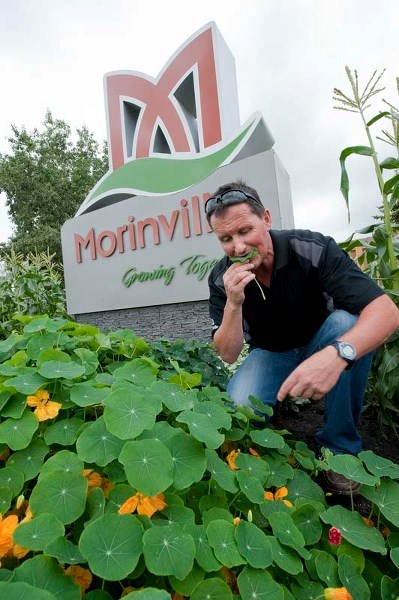The streets of Morinville have gotten a lot more delicious this summer thanks to a new local food program – one that's proven to be a hit with town residents.
In the spring town staff replaced many of the inedible ornamentals that usually grace Morinville's public gardens with fruits and vegetables as part of a push to promote healthy living. Now, almost all those incredibly edible plants are ready for harvest and residents have already started to chow down.
The beets have all been eaten, said Donald Fairweather, operations manager with the town's public works department, as has much of the raspberry and rhubarb.
"The carrots were all gone as of this weekend," he said.
But there's still plenty of parsley, sage and other plants, plus tomatoes and corn to come.
He's personally a fan of the nasturtium – a spicy, leafy green plant with yellow and red flowers that goes great with salad.
"I walk past some of the beds … (and) I'm picking stuff and chewing as I go along."
The edible plants are part of Morinville's Incredible Edible project, said Valerie Loseth, president of the Morinville Centennial Community Garden Society. Inspired by a similar program in Todmorden, U.K., she and Coun. Lisa Holmes convinced council to spend $5,000 this year to plant crops instead of flowers in the town's ornamental gardens – crops that are free for residents to eat.
The town has planted a cornucopia of crops this year in the planters along 100 Street, the town library, public works yard and the north and east entrance signs. Residents are encouraged to sample whatever they like from these public plots.
Plants include corn, lettuce, tomatoes, onions, peas, beans, parsley, sunflowers and saskatoons. None have been sprayed with pesticides and most require about the same amount of water as conventional ornamentals. Small signs in the planters list facts about the different plants and suggest ways they can be used.
Weed resistant
The gardens have had some problems with trampling and premature harvest, Fairweather said – the carrots could have been much bigger given a few more weeks – but have otherwise been untouched by vandals and hungry rabbits.
The plants have been less prone to theft than traditional ornamentals, he continued, and more weed-resistant, as they tend to crowd out everything else. They also regenerate themselves, with other crops moving in to replace ones that have been harvested.
The town has also partnered with the local community garden group to hold free classes this summer to teach residents what to do with these fruits and vegetables, Loseth added. (They're holding a course on canning this Aug. 22.)
This project is meant to teach residents about what they can grow in town, Fairweather said, and promote sustainable living.
"Morinville is an agricultural area, so we're trying to get back to our roots," he said.
The crops have prompted a lot of positive comments from residents, said Loseth and Fairweather, especially online. Still, Loseth admits that many residents don't even realize these vegetables are there.
The plants will be available until the end of September, at which point any that are left will likely be sent to the local food bank, Fairweather said.
The town plans to continue the program this fall by planting apple and cherry trees and to plant new edibles next year.
Loseth hopes this project will promote local food production and healthy eating habits.
"You don't have to purchase things from Sobey's that have to travel 5,000 kilometres to get to you," she said. "It's all available just outside your door."




